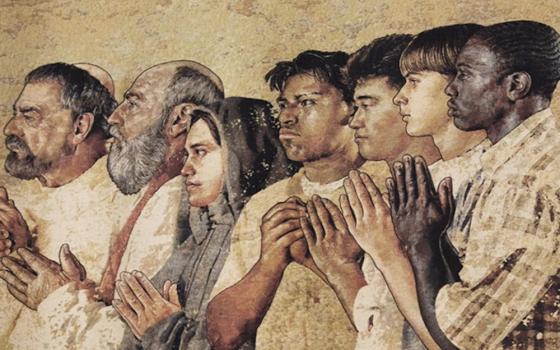A priest kisses the feet of a homeless person at a temporary shelter in Manila, Philippines, April 9, 2020, Holy Thursday, during the coronavirus pandemic. (CNS/Reuters/Eloisa Lopez)
Editor's note: NCR is sharing again with our readers this engaging triduum resource created in 2020 by board member and composer Dan Schutte. You can find the entire Easter triduum virtual liturgy celebration here.
The liturgy of Holy Thursday, the celebration of the Lord's Supper, is our celebration of the paschal mystery.
The church understands these days as being one extended liturgy, not three separate celebrations. The rituals of these days are filled with symbols that capture our imagination: a meal among friends, the washing of feet, a wooden cross, water, light, darkness, fire.
Let the music of these days into your hearts. Let the prayer seep into your soul. And savor the images that can open us to the presence of a God who loves us to death.
Opening: Glory in the cross
The entrance antiphon for Holy Thursday, taken from St. Paul's letter to the Galatians, sets the stage and captures the theme of the entire triduum liturgy. "We should glory in the Cross of our Lord Jesus Christ, in whom is our salvation, life and resurrection, through whom we are saved and delivered." And so we begin our journey through these holy days.
Scripture readings and psalm
The Scripture readings for Holy Thursday are all familiar to us and present three major themes: God's unwavering faithfulness, Christ's presence when we gather for the Eucharist and the call to selfless love and humble service. The three readings are woven together here and presented as one unit with each reading separated by the singing of a psalm response.
Homily
In every liturgy the homily is meant to break open the meaning of the Scripture for us today, at this moment in history. Every year we hear these readings, they will mean something different for us because we are different. And so we listen with not only our minds, but also with our hearts and imaginations.
Washing of feet: As I have done for you
The ritual of the washing of feet provides one of the primary symbols and themes on this day. When Jesus tells us to "love one another as I have loved you," he's showing us how that love is made real. Our love for each other is not just expressed in words but in humble service. As we sing and listen to the song, let your imagination remember the way your community has celebrated this rite over the years.
Prayer at the table: God of our life
While many of us still do not gather in a church building for Mass with a priest, it is still at the heart of our coming together to give thanks and praise to a God who has blessed us so abundantly. This song of thanksgiving was originally written as a way for people to pray The Great Thanksgiving when a priest is not available. As we sing, we bring all those people and things for which we are most grateful. We join them with the prayer of Christ in offering them to our God.
Communion hymn: Where love is found
It is not surprising that in the church's long history the Latin hymn "Ubi Caritas" ("Where Love Is") has been central to the Holy Thursday liturgy. When Jesus told his friends to love one another, he made the connection between love and the presence of God. Where we see love, we see the face of God. So today we sing this English version as our communion hymn.
Advertisement
Thanksgiving: Deyenu litany
This beautiful Jewish Dayenu prayer has its origin in the Passover celebration where a family would recount all the memories of God's goodness and favor beginning with creation to this very day. With each memory, they would acknowledge that even though "this would have been enough," God added yet more to the abundance of gifts. For us Christians, this comes to include God's giving us his beloved Son. At the end of this song, I'd encourage you to add your own remembrances to the list of God's graciousness.
Closing hymn: Song of farewell
The final of the Holy Thursday liturgy is the Stripping of the Altar. There is no closing hymn and this silent, somber ritual sets the stage for Jesus' entrance into his Passion. One may decide to skip this final piece of music and rest in the quiet of the moment. But I've included this piece for those that might find it helpful. It's a setting of the "In Paradisum," the song of farewell that we sing at the end of funerals where we send our loved one into the arms of God.
[Dan Schutte, an NCR board member, is the composer-in-residence at the University of San Francisco.]




